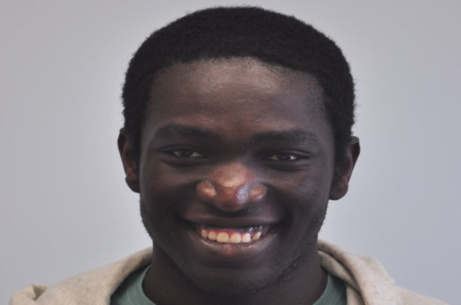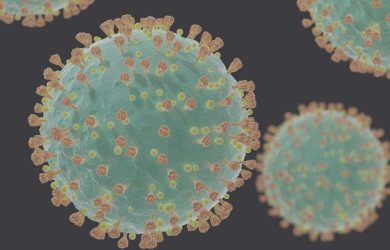
Chidi Akusobi is interested in antiobiotic resistance and infectious disease.
As a promising young student, Chidiebere Akusobi took part in a programme for inner city students in New York which gained him entry to an elite private school.
From there it was a short step to Yale, where he has been studying evolutionary biology for the last four years.
Now he is about to embark on an MPhil at the University of Cambridge, focusing on the interaction between viruses and bacteria. But allied to his studies is a strong desire to infuse public school children with an enthusiasm and appreciation of science.
Born in Nigeria, Chidi’s academic success is in part a result of his parents’ focus on education. At the age of two he moved to the Bronx in New York to join his father who was studying to be a registered nurse. His mother had been a teacher in Nigeria, but was unable to teach in the US so for 10 years before herself qualifying as a registered nurse dedicated herself to the family, reading to Chidi every day until he started kindergarten. As a result, he loved learning and, as a child, was always reading or learning new things.
Because of his academic aptitude, he was chosen for a Prep for Prep leadership programme for inner-city students and won a place at the elite private Horace Mann School where he excelled at science, although he also found the time to write and perform plays and be on the dance and track teams.
In the summer after his senior year he took part in a National Institutes of Health internship programme which led to him taking part in a research project at Weill Cornell Medical School. “What I knew about science before that was what I had learnt in the classroom,” he says. “It was about information that had already been discovered. The internship was the first time I had done research and discovered things for myself and I got to present my findings to the National Institutes of Health.” It was to prove a defining experience.
Chidi [2012] had already chosen to go to Yale, but had been thinking about doing arts and science. After the internship, though, he opted to major in biology.
However, he kept up his interest in the arts through extracurricular activities such as teaching playwriting to children in the ninth grade of a local arts school and being on Yale’s Step dancing team.
He was also involved in outreach work, with his experience on the Prep for Prep programme acting as a spur. The first group he joined at Yale was Demos, the largest science education community service organisation on Yale’s campus which puts students who want to teach science into inner city public schools.
Once a week, he went into a school and worked on science projects with the students. It was the first of a series of outreach programmes he was involved with. He says: “Science is not a main focus for many public schools in the US due to a lack of materials and resources. The science experience students have is not great compared to somewhere like Horace Mann where science classes were phenomenal and taught by excellent teachers. That’s why I wanted to give back and get public school students excited by science.”
In addition he is a STEM peer mentor to Yale freshmen and coordinates Yale’s Ecology and Evolutionary Biology Undergraduate Group.
He has also served as the co-publisher of the Yale Scientific Magazine (YSM) and co-coordinator of YSM-Presents, the magazine’s umbrella community service organisation.
And he was the team leader for Yale iGEM, a synthetic biology research team that was named an Americas Regional Finalist and won Best Natural Product at the 2011 World Championships. The project involved biochemically characterising a novel antifreeze protein extracted from a Siberian beetle. Chidi and his team then crystallised the protein and resolve its crystal 3D structure.
Biology
At Yale Chidi’s studies concentrated on evolutionary biology. “When I was little I played with bugs and was fascinated by animals and plants. I was always interested in the history and origins of life and in evolutionary change,” he says.
He became interested in viruses as he felt they were a good way to study evolutionary biology. “Viruses are numerous and have high mutation rates, so they make good systems to study adaptation and evolutionary change,” he says. He is currently focusing on how viruses can be engineered to better attach to and kill bacterial hosts. His research, which was funded through a Bouchet-Robertson Fellowship, adds to the growing field of phage therapy, an alternative treatment to antibiotics.
Whilst still an undergraduate, he presented his research to the American Society for Microbiology conference in 2011. He also presented it to the Annual Biomedical Research Conference for Minority Students, where he won Best Oral Presentation in Microbiology, and he will present at the 2012 EVOLUTION conference in Ottawa, Canada, over the summer.
Chidi decided to apply to the University of Cambridge because he was interested in doing phage research from a more biochemical standpoint. He says: “I wanted to learn about the molecular detail of phage-host interactions and found a lab at Cambridge that does exactly that type of work. My research experience beforehand looked at such interactions from an evolutionary biology perspective, but if phage are to be utilised as drugs, their evolutionary biology as well as biochemical interactions with host bacteria are important to understand.” His MPhil in Biochemistry will focus on the evolutionary dynamics and biochemistry of phage abortive infection, a mechanism that allows bacteria to gain immunity to viral attack.
After finishing his MPhil, he plans to do an MD-PhD degree and conduct research at the cross section of evolutionary biology and infectious disease. He says: “I’m particularly interested in antibiotic resistance and novel approaches to treating bacterial diseases. As an MD, I look forward to translating my research to the bedside.”












